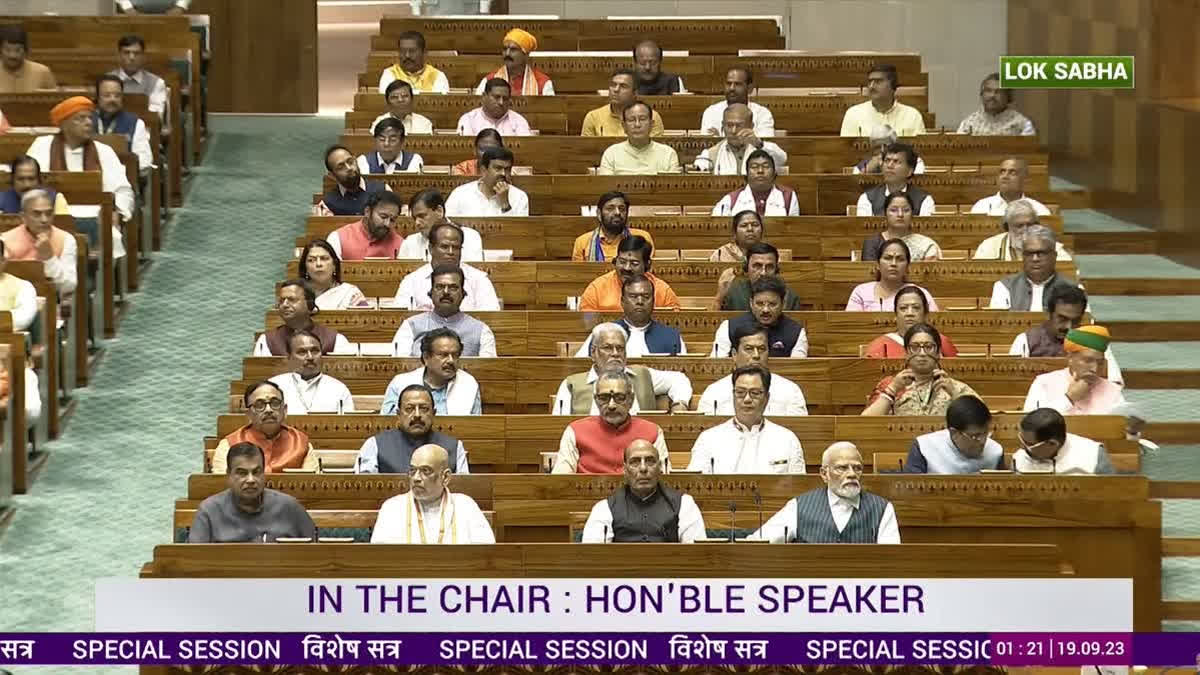New Delhi:The Women's Reservation Bill, a long-cherished dream for gender equality in India, took a significant step forward as it secured an overwhelming majority in the Lok Sabha on Day 3 of the special session of Parliament commemorating India's 75th anniversary of independence. However, the bill now faces a crucial test in the Rajya Sabha on Day 4, where it will be debated and voted upon.
The bill, which proposes to reserve one-third of seats in the Lok Sabha and state assemblies for women, received 454 votes in favor and only two votes against it in the Lok Sabha. This momentous achievement comes after decades of attempts and discussions surrounding women's participation in Indian politics.
Also read: UN Women India rep Susan Ferguson hails Women's Reservation Bill, calls it a 'landmark moment' for gender equality
The journey of the Women's Reservation Bill has been long and arduous. The bill was initially introduced in the Rajya Sabha in 2008 during the UPA government led by Manmohan Singh. After two years of deliberations and revisions, it was passed by the Rajya Sabha in 2010. However, it never made its way to the Lok Sabha for consideration, leaving its fate uncertain for years.
Read more: Women's Reservation Bill 2023 to be introduced in Lok Sabha; reserves one-third seats in LS, legislative assemblies, Delhi Assembly for women
In the current special session of Parliament, BJP President JP Nadda and Union Finance Minister Nirmala Sitharaman are scheduled to speak in favour of the bill in the Rajya Sabha. A total of 14 women MPs and ministers from the BJP are expected to debate the bill, representing diverse communities. Notably, three women MPs from the Other Backward Classes (OBC) community, along with two each from the Scheduled Caste and Scheduled Tribe communities, are among those participating in the debate.
While the bill's passage in the Lok Sabha is a significant milestone, its implementation timeline remains a subject of debate. The bill stipulates that the women's quota can only be implemented after the first delimitation of constituencies, which is likely to occur in 2027. Delimitation is conducted following each census, and the next census is scheduled after the upcoming general elections. Therefore, the bill may not become effective until 2029.
This potential delay has raised concerns and provided ammunition to opposition parties who are demanding urgent implementation of the bill, with a sub-quota for OBCs. Congress parliamentary party chief Sonia Gandhi, during her opening statement in Parliament, expressed frustration, saying, "For the last 13 years, Indian women have been waiting for their political responsibilities, and now they are being asked to wait for a few more years -- two years, four years, six years, eight years."
Congress leader Rahul Gandhi echoed these sentiments, questioning the need for a new census and delimitation, stating, "I wonder if this is not designed to push it forward by seven or eight years and let it play out the way it does."
Responding to these concerns, Union Home Minister Amit Shah clarified that both delimitation and the census will commence after the next general election. He urged all members of Parliament to rise above partisan politics and pass the bill unanimously, emphasizing the importance of respecting and empowering women in politics.
"Let us rise above partisan politics to give women the respect they deserve. Earlier they have been left disappointed four times by Parliament. Let this bill be passed unanimously," Shah said.
Prime Minister Narendra Modi celebrated the passage of the bill with overwhelming support and thanked MPs from all parties for their votes. He noted, "The Nari Shakti Vandan Adhiniyam is a historic legislation which will further boost women empowerment and will enable even greater participation of women in our political process," the PM posted on X.
